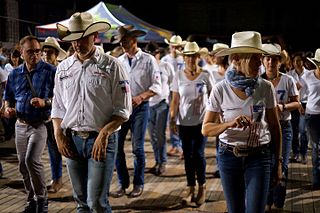
The performing arts are arts such as music, dance, and drama which are performed for an audience. They are different from the visual arts, which are the use of paint, canvas or various materials to create physical or static art objects. Performing arts include a range of disciplines which are performed in front of a live audience, including theatre, music, and dance.

Ballet is a type of performance dance that originated during the Italian Renaissance in the fifteenth century and later developed into a concert dance form in France and Russia. It has since become a widespread and highly technical form of dance with its own vocabulary. Ballet has been influential globally and has defined the foundational techniques which are used in many other dance genres and cultures. Various schools around the world have incorporated their own cultures. As a result, ballet has evolved in distinct ways.

Swing dance is a group of social dances that developed with the swing style of jazz music in the 1920s–1940s, with the origins of each dance predating the popular "swing era". Hundreds of styles of swing dancing were developed; those that have survived beyond that era include Lindy Hop, Balboa, Collegiate Shag, and Charleston. Today, the best-known of these dances is the Lindy Hop, which originated in Harlem in the early 1930s. While the majority of swing dances began in African-American communities as vernacular African-American dances, some influenced swing-era dances, like Balboa, developed outside of these communities.

A line dance is a choreographed dance in which a group of people dance along to a repeating sequence of steps while arranged in one or more lines or rows. These lines usually face all in the same direction, or less commonly face each other. Unlike circle dancing, line dancers are not in physical contact with each other. Each dance is usually associated with, and named for, a specific song, such as the Macarena or Electric Slide are a few of the line dances that have consistently remained part of modern American culture for years.

A novelty song is a type of song built upon some form of novel concept, such as a gimmick, a piece of humor, or a sample of popular culture. Novelty songs partially overlap with comedy songs, which are more explicitly based on humor, and with musical parody, especially when the novel gimmick is another popular song. Novelty songs achieved great popularity during the 1920s and 1930s. They had a resurgence of interest in the 1950s and 1960s. The term arose in Tin Pan Alley to describe one of the major divisions of popular music; the other two divisions were ballads and dance music. Humorous songs, or those containing humorous elements, are not necessarily novelty songs.

Simchat Torah or Simhat Torah is a Jewish holiday that celebrates and marks the conclusion of the annual cycle of public Torah readings, and the beginning of a new cycle. Simchat Torah is a component of the Biblical Jewish holiday of Shemini Atzeret, which follows immediately after the festival of Sukkot in the month of Tishrei.

Social dances are dances that have a social functions and context. Social dances are intended for participation rather than performance. They are often danced merely to socialise and for entertainment, though they may have ceremonial, competitive and erotic functions.

Historical dance is a term covering a wide variety of Western European-based dance types from the past as they are danced in the present. Today historical dances are danced as performance, for pleasure at themed balls or dance clubs, as historical reenactment, or for musicological or historical research.

Cecil James Sharp was an English-born collector of folk songs, folk dances and instrumental music, as well as a lecturer, teacher, composer and musician. He was the pre-eminent activist in the development of the folk-song revival in England during the Edwardian period. According to Folk Song in England, Sharp was the country’s "single most important figure in the study of folk song and music."

The culture of Cuba is a complex mixture of different, often contradicting, factors and influences. The Cuban people and their customs are based on European, African and Amerindian influences.

A tutu is a dress worn as a costume in a classical ballet performance, often with attached bodice. It may be made of tarlatan, muslin, silk, tulle, gauze, or nylon. Modern tutus have two basic types: the Romantic tutu is soft and bell-shaped, reaching the calf or ankle; the Classical tutu is short and stiff, projecting horizontally from the waist and hip.

The International Dolls Museum is a large collection of dolls in Delhi, India. It was set up by K. Shankar Pillai, a political cartoonist. Housed in the Children's Book Trust building on Bahadur Shah Zafar Marg, accessed through a separate entrance, a winding staircase, leading up to a foyer. The museum has a floor area of 5,184.5 sq ft (481.66 m2) and occupies a portion of the first floor.
Pachanga is a genre of music which is described as a mixture of son montuno and merengue and has an accompanying signature style of dance. This type of music has a festive, lively style and is marked by jocular, mischievous lyrics. Pachanga originated in Cuba in the 1950s and played an important role in the evolution of Caribbean style music as it is today. Considered a prominent contributor to the eventual rise of salsa, Pachanga itself is an offshoot of Charanga style music. Very similar in sound to Cha-Cha but with a notably stronger down-beat, Pachanga once experienced massive popularity all across the Caribbean and was brought to the United States by Cuban immigrants post World War II. This led to an explosion of Pachanga music in Cuban music clubs that influenced Latin culture in the United States for decades to come.

Meridel Le Sueur was an American writer associated with the proletarian literature movement of the 1930s and 1940s. Born as Meridel Wharton, she assumed the name of her mother's second husband, Arthur Le Sueur, the former Socialist mayor of Minot, North Dakota.

A lap is a surface created between the knee and hips of a biped when it is in a seated or lying down position. The lap of a parent or loved one is seen as a physically and psychologically comfortable place for a child to sit.

A book cover is any protective covering used to bind together the pages of a book. Beyond the familiar distinction between hardcovers and paperbacks, there are further alternatives and additions, such as dust jackets, ring-binding, and older forms such as the nineteenth-century "paper-boards" and the traditional types of hand-binding. The term "Bookcover" is often used for a book cover image in library management software. This article is concerned with modern mechanically produced covers.
The talk about sex, often colloquially referred to as "the birds and the bees" or "the facts of life", is generally the occasion in most children's lives when their parents explain what sex is and how to do it.

The traditional music of the Philippines reflects the Philippines' diverse culture, originating from more than 100 ethnolinguistic groups and shaped by a widely varying historical and sociocultural milieu.

"I Hope You Dance" is a crossover country pop song written by Mark D. Sanders and Tia Sillers and recorded by American country music singer Lee Ann Womack with Sons of the Desert. It is the title track on Womack's 2000 album. Released in March 2000, the song reached number one on both the Billboard Hot Country Singles & Tracks and Hot Adult Contemporary Tracks charts, and also reached number fourteen on the Billboard Hot 100. It is considered to be Womack's signature song, and it is the only Billboard number one for both Womack and Sons of the Desert.

The Gayo people are an ethnic group living in the highlands of Aceh Province, Sumatra, Indonesia. The Gayo tribe has a population of 336,856 and they live predominantly in the mountains. Most Gayo live in three regencies in Aceh namely Bener Meriah, Central Aceh, and Gayo Lues. Some of them live in several districts in other regencies, such as Serbejadi District, Simpang Jernih District, and Peunaron District in East Aceh Regency and Beutong District in Nagan Raya Regency. Other than that, the Gayo population also covers Southeast Aceh Regency and Aceh Tamiang Regency. Their homeland lies in the Barisan Mountains which has elevations of over 12,000 feet and extends more than one thousand miles. The Gayonese language has four dialects: Lut, Serbejadi-Lukup, Lut and Luwes. Their language does not have a writing system, but folk tales, stories and poetry are passed down in oral tradition. The traditional house of the Gayo is called Umah.


















